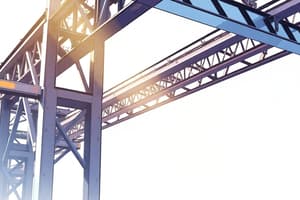Podcast
Questions and Answers
Why are structural steels considered tough?
Why are structural steels considered tough?
- They have low elongation.
- They are not susceptible to corrosion.
- They are resistant to large deformations.
- They have high strength and high ductility. (correct)
What advantage does steel have that allows it to be bent, hammered, and sheared without visible damage?
What advantage does steel have that allows it to be bent, hammered, and sheared without visible damage?
- High resistance to corrosion
- Toughness with large elongation (correct)
- High tensile strength
- Increased resistance to buckling
Why do most steels need periodic painting when freely exposed to air and water?
Why do most steels need periodic painting when freely exposed to air and water?
- To reduce elongation during tension
- To prevent corrosion (correct)
- To increase their tensile strength
- To prevent susceptibility to buckling
In what common situation does the strength of structural members reduce significantly?
In what common situation does the strength of structural members reduce significantly?
How does the danger of buckling in a compression member change with an increase in length and slenderness?
How does the danger of buckling in a compression member change with an increase in length and slenderness?
What allows steel structures to have new bays or entire wings added to them without issues?
What allows steel structures to have new bays or entire wings added to them without issues?
What undesirable property of steel is mentioned in the text?
What undesirable property of steel is mentioned in the text?
Which type of structures are listed as examples of where steel is used?
Which type of structures are listed as examples of where steel is used?
What is emphasized about the structural shapes of steel in the text?
What is emphasized about the structural shapes of steel in the text?
What organization published the Steel Construction Manual?
What organization published the Steel Construction Manual?
What type of shapes, commonly used in steel structures, are mentioned in the text?
What type of shapes, commonly used in steel structures, are mentioned in the text?
How are structural shapes identified for use in drawings, specifications, and designs?
How are structural shapes identified for use in drawings, specifications, and designs?
Why is the high strength of steel per unit of weight important in construction?
Why is the high strength of steel per unit of weight important in construction?
How does the uniformity of steel properties compare to reinforced-concrete structures?
How does the uniformity of steel properties compare to reinforced-concrete structures?
Which mechanical property of steel allows it to withstand extensive deformation without failure under high tensile stresses?
Which mechanical property of steel allows it to withstand extensive deformation without failure under high tensile stresses?
Why is the characteristic of elasticity in steel advantageous in design?
Why is the characteristic of elasticity in steel advantageous in design?
What is the implication of the property of permanence in steel frames?
What is the implication of the property of permanence in steel frames?
How does the property of ductility in steel contribute to its structural behavior?
How does the property of ductility in steel contribute to its structural behavior?
Flashcards are hidden until you start studying
Study Notes
Structural Steels
- Structural steels are considered tough because they can withstand bending, hammering, and shearing without visible damage.
- Steel's ability to be bent, hammered, and sheared without damage is due to its advantage of being ductile and having high strength.
Corrosion and Protection
- Most steels need periodic painting when exposed to air and water to prevent corrosion.
- The strength of structural members can reduce significantly in situations where corrosion occurs.
Buckling in Compression Members
- The danger of buckling in a compression member increases with an increase in length and slenderness.
- As compression members become longer and more slender, they are more susceptible to buckling.
Steel Structures and Modifications
- Steel structures can have new bays or entire wings added to them without issues due to the flexibility of steel.
- The property of ductility in steel allows it to withstand extensive deformation without failure under high tensile stresses.
Undesirable Properties of Steel
- The undesirable property of steel mentioned in the text is corrosion.
Types of Steel Structures
- Examples of structures where steel is used include high-rise buildings, long-span bridges, and industrial buildings.
Structural Shapes of Steel
- The text emphasizes the importance of structural shapes of steel, which are standardized and widely available.
- The American Institute of Steel Construction (AISC) published the Steel Construction Manual, which provides guidelines for steel design and construction.
Identification and Properties of Steel
- Structural shapes are identified for use in drawings, specifications, and designs using a standardized system.
- Steel has high strength per unit of weight, which is important in construction because it allows for efficient use of materials.
- The uniformity of steel properties is superior to reinforced-concrete structures, which can have varying properties.
- The mechanical property of steel that allows it to withstand extensive deformation without failure under high tensile stresses is ductility.
Elasticity and Permanence
- The characteristic of elasticity in steel is advantageous in design because it allows steel to return to its original shape after deformation.
- The property of permanence in steel frames implies that they can maintain their shape and structure over time.
Ductility and Structural Behavior
- The property of ductility in steel contributes to its structural behavior by allowing it to absorb energy and deform without failing under high tensile stresses.
Studying That Suits You
Use AI to generate personalized quizzes and flashcards to suit your learning preferences.




